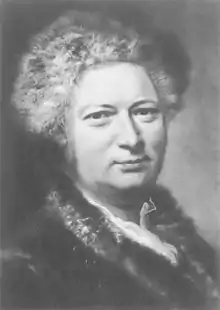Friedrich von Hagedorn
Friedrich von Hagedorn (23 April 1708 – 28 October 1754), German poet, was born at Hamburg, where his father, a man of scientific and literary taste, was Danish ambassador.[1] His younger brother, Christian Ludwig, was a well known art historian and collector.

Biography
Life
He was educated at the gymnasium of Hamburg, and later (1726) became a student of law at Jena. Returning to Hamburg in 1729, he obtained the appointment of unpaid private secretary to the Danish ambassador in London, where he lived till 1731.[2] Hagedorn's return to Hamburg was followed by a period of great poverty and hardship, but in 1733 he was appointed secretary to the so-called "English Court" (Englischer Hof) in Hamburg, a trading company founded in the 13th century.[2] He shortly afterwards married, and from this time had sufficient leisure to pursue his literary occupations until his death.[3]
Career
The first collection of Hagedorn's poems was published at Hamburg shortly after his return from Jena in 1729, under the title Versuch einiger Gedichte (reprinted by A. Sauer, Heilbronn, 1883). In 1738 appeared Versuch in poetischen Fabeln und Erzählungen;[4] in 1742 a collection of his lyric poems, under the title Sammlung neuer Oden und Lieder;[4] and his Moralische Gedichte in 1750.[4] A collection of his entire works was published at Hamburg in 1757 after his death. The best is J.J. Eschenburg's edition (5 vols., Hamburg, 1800). Selections of his poetry with an excellent introduction in F. Muncker's Anakreontiker und preussisch-patriotische Lyriker (Stuttgart, 1894). See also H. Schuster, F. von Hagedorn und seine Bedeutung für die deutsche Literatur (Leipzig, 1882); W. Eigenbrodt, Hagedorn und die Erzählung in Reimversen (Berlin, 1884).[3]
Mozart set his poem Die Alte (The Old Woman) in his song of the same name (K. 517) in 1787. Joseph Haydn set two of his poems in his canons (a capella songs) (Hob. XXVIIb).
References
- Britannica Online. "Friedrich von Hagedorn". Britannica eb.com. Retrieved 19 February 2012.
- Pohl, Wolfgang. "Friedrich von Hagedorn" (in German). Studio für alte Literatur. Retrieved 19 February 2012.
- Chisholm 1911.
- Projekt Gutenberg-DE. "Friedrich von Hagedorn". Spiegel Online. Retrieved 19 February 2012.
- This article incorporates text from a publication now in the public domain: Chisholm, Hugh, ed. (1911). "Hagedorn, Friedrich von". Encyclopædia Britannica. Vol. 12 (11th ed.). Cambridge University Press. p. 813.
External links
- Poems of Friedrich von Hagedorn (Complete) (in German)